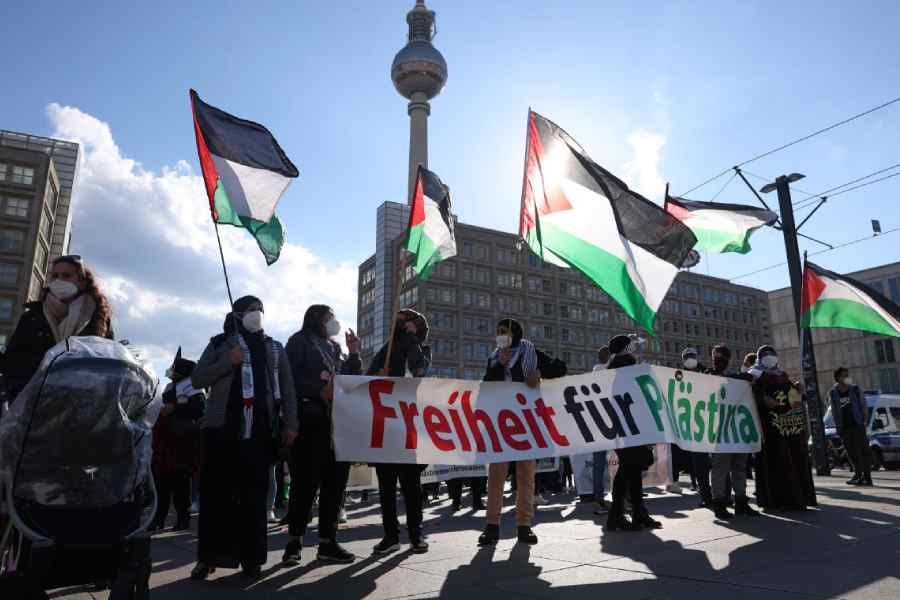In the neighbourhood in Berlin where I live, the streets have been dominated since October 7 by riot police flanking pro-Palestine protests. Reports of violent and arbitrary arrests of protesters have been common. Minors have allegedly been arrested for wearing Palestinian-affiliated clothing; a Jewish woman was detained for displaying an anti-war placard; and a video of a police officer in riot gear stamping out memorial candles for Palestinian civilians killed in Israeli air strikes has been circulated on social media — all in the name of protecting Jewish life in Germany.
There is little visible Jewish life in Berlin, or at least hardly any that is recognisable to me. It was only when I arrived in Europe that I realised how much my Jewishness was considered bound to Israel. In a recent article in The Baffler, a fellow American, Jewish, Berlin-based writer, Alex Cocotas, describes that when a Berlin neighbour finds out he is Jewish, he is enthusiastically told how much his neighbour loves hummus. While there are seemingly endless festivals or events dedicated to ‘Jewish Heritage’, they almost always seem to predominantly feature the Israeli flag, Israeli food, Israeli films, Israeli artists — in other words, “Israel, Israel, Israel,” Cocotas writes. My Jewishness and the Jewishness of my family and friends, unbound to a specific nation state, is strangely absent in this particular vision of who gets to be a Jew.
It never fails to surprise me that Germans seem to wholly forget that the Jews they killed in the Holocaust were not a foreign people. The Jews that they murdered were extensions of themselves, living among them for centuries. They were European. The food my Jewish grandmother made was essentially a variation of German food. The Yiddish my grandfather spoke as a child is basically German with some Hebrew mixed in. Many of the Jews that were killed in the Holocaust had for long been integrated into German society and had hardly any relationship to religious Judaism at all; and in many cases, they had none. Jews were hated for their ‘rootlessness’, but now Germans are eager to celebrate those newfound roots in Israel. The horror of the Holocaust was not only the result of an intent to exterminate an entire people, along with many other kinds of undesirable citizens, but also the consequence of the country viciously turning against its weakest self.
Israel has long been portraying itself as the true homeland of the world’s Jews and, as such, has become synonymous with Jewish culture globally. In 2015, Benjamin Netanyahu boldly proclaimed himself as “not only the prime minister of Israel but [also] as representative of the entire Jewish people.” For Netanyahu, people like me, born and bred in diaspora, are merely Israelis-in-waiting.
This makes life for non-Israeli Jews all the more dangerous as they are expected to answer for a nation’s crimes that have nothing to do with them. Most Jews around the world choose to live in multicultural societies rather than the singularly Jewish State that Israel has attempted to create through a system of illegal settlements, occupation, and apartheid laws that make Palestinians second-class citizens.
Contemporary leaders of Israel might have the world believe that it is not merely a Jewish State, but the Jewish State. And Germans have taken this assertion to heart without resistance. In 2008, Angela Merkel delivered a speech in which she declared that “Israel’s security is Germany’s Staatsraison” — its reason to be a State. Germany’s public atonement for its crimes in the Second World War has made its interpretation of antisemitism strangely literal —because Israel is a self-proclaimed Jewish State, criticism of it is deemed inherently antisemitic. It’s a funhouse mirror logic that seems to be well-intentioned and, yet, is deeply dangerous for Jews in the diaspora.
Less than a month after Hamas’s attacks that left 1,200 dead and took more than 250 hostages, the vice-chancellor of Germany, Robert Habeck, posted a speech on X that decried any and all forms of antisemitism. This in itself is a noble aim. But Germany officially subscribes to the International Holocaust Remembrance Alliance’s definition of antisemitism which includes seven examples pertaining to criticism of the Israeli government and has been pushed by pro-Israeli organisations worldwide to become the standard legal definition of antisemitism.
In his speech posted on X, Habeck said that Germans would face consequences in court and added “if you’re not German, you also risk your residency status.” The comments were widely considered to be directed at immigrants, particularly those with Muslim backgrounds, who are routinely blamed for antisemitism in Germany. Habeck went on to blame “parts of the political Left” and warned that “anti-colonialism must not lead to antisemitism.”
My own right to stay in Germany is subject to yearly renewal. Will my visa be revoked or simply not renewed if I express the wrong opinions? Perhaps evidenced by this very article? Anecdotally I have also heard from friends with Middle-Eastern backgrounds, many of whom were drawn to Germany for its reputation for tolerance and acceptance fostered by Germany’s commitment to reckoning with its past. Now, with Germany creating tighter restrictions on immigration and threatening consequences for pro-Palestine activism, these friends of mine are looking for new places to call home.
Jewish life around the world is a varied thing. Israel is a State with highly-advanced weapons and an army; it should be understood as exactly that. Israel is not representative of the entire Jewish world despite what leaders like Netanyahu would have people believe. If Germany wants to truly protect the world’s Jews, or even just the Jews living in Germany, it can start by understanding that criticism of Israel is not antisemitism. And Germans can listen to the Jews who are saying exactly that and are asking to be heard.
Carol Schaeffer is a journalist based in New York and Berlin from where she writes about Europe, politics and culture











